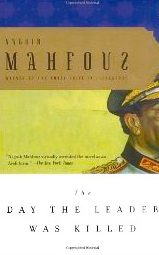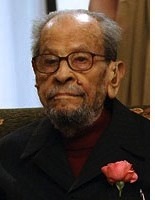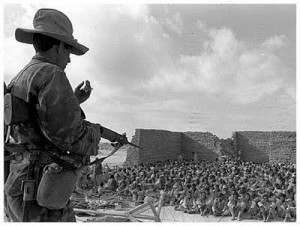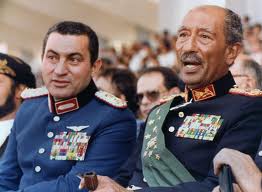Note: Naguib Mahfouz was WINNER of the Nobel Prize for Literature in 1988.
“We are a people more given to defeat than to victory. The strain that spells out despair has become deeply ingrained in us because of the countless defeats we have had to endure. As for this victorious, smug one [Anwar Sadat]…he left us his Infitah, which only spelled out poverty and corruption. This is the crux of the matter.”
Always focusing on aspects of Egyptian social and political history in his novels, Nobel Prize-winning author Naguib Mahfouz here depicts three generations of one family as they try to survive the socially tumultuous period between the Six Day War with Israel in 1967 and the assassination of Anwar Sadat in 1981. The loss of the Six Day War in 1967 was a national humiliation for Egypt, which lost the Sinai Peninsula and the Gaza Strip, as a result. Following the death of President Gamal Abdel Nasser in 1970, his successor President Anwar Sadat tried to regain the lost territories with a surprise attack that initiated the Yom Kippur War in 1973, but again Egypt failed to win a strong military victory. Sadat did express an interest in negotiating with the Israelis, however, and the Camp David Accords of 1978 resulted in the Egyptians regaining the Sinai Peninsula in exchange for Egypt’s recognition of Israel and the establishment of normal diplomatic relations, the first Arab country to do so.
on aspects of Egyptian social and political history in his novels, Nobel Prize-winning author Naguib Mahfouz here depicts three generations of one family as they try to survive the socially tumultuous period between the Six Day War with Israel in 1967 and the assassination of Anwar Sadat in 1981. The loss of the Six Day War in 1967 was a national humiliation for Egypt, which lost the Sinai Peninsula and the Gaza Strip, as a result. Following the death of President Gamal Abdel Nasser in 1970, his successor President Anwar Sadat tried to regain the lost territories with a surprise attack that initiated the Yom Kippur War in 1973, but again Egypt failed to win a strong military victory. Sadat did express an interest in negotiating with the Israelis, however, and the Camp David Accords of 1978 resulted in the Egyptians regaining the Sinai Peninsula in exchange for Egypt’s recognition of Israel and the establishment of normal diplomatic relations, the first Arab country to do so.

This tumultuous period was not only a period in which the nation suffered blows to its national self-image, both at home and among its neighboring Arab states, because of its military losses, but also a period of enormous economic hardships. Sadat had turned away from the Soviets, with whom Nasser had had a close association, and had established the Infitah, his attempt to establish a free-market economy in the desperately poor country. As Elwan Fawwaz Muhtashimi, one of the main characters in this novel says, however, “For this we cursed him, our hearts full of rancor. And, ultimately, he [Sadat] was to keep for himself the fruits of victory, leaving us his Infitah, which only spelled out poverty and corruption. This is the crux of the matter.”
Alternating points of v iew among Muhtashimi Zayed, his grandson Elwan Fawwaz Muhtashimi, and Elwan’s fiancée Randa Sulayman Mubarak, Mahfouz creates a novel which shows the domestic difficulties faced by educated Egyptian city-dwellers as they try to live their lives under this unpopular, less structured new economic system, which has replaced the system with which they have long been familiar. Elwan and Randa have been engaged for eleven years, unable to marry because, though Elwan has attended college and has a job, his salary is too low for him to save enough “key money” to buy furniture and support a wife. Theirs would be a love marriage, but Elwan is making little progress toward their goal. “[Elwan] hurls himself against rocks and clutches at thin air,” Randa notes, miserably. She is angry about “those hollow slogans that the authorities hurl at us,” describing the times as “a nauseating age…Between the slogans and the truth is an abyss in which we have all fallen and lost ourselves.”
iew among Muhtashimi Zayed, his grandson Elwan Fawwaz Muhtashimi, and Elwan’s fiancée Randa Sulayman Mubarak, Mahfouz creates a novel which shows the domestic difficulties faced by educated Egyptian city-dwellers as they try to live their lives under this unpopular, less structured new economic system, which has replaced the system with which they have long been familiar. Elwan and Randa have been engaged for eleven years, unable to marry because, though Elwan has attended college and has a job, his salary is too low for him to save enough “key money” to buy furniture and support a wife. Theirs would be a love marriage, but Elwan is making little progress toward their goal. “[Elwan] hurls himself against rocks and clutches at thin air,” Randa notes, miserably. She is angry about “those hollow slogans that the authorities hurl at us,” describing the times as “a nauseating age…Between the slogans and the truth is an abyss in which we have all fallen and lost ourselves.”

As Muhtashimi Zayed, the grandfather, muses on the changes that have taken place and contemplates the joys of worship as he approaches death, he also reflects the changing religious and cultural climate, since his son, Elwan’s father, is an atheist at a time in which religious fundamentalism is growing. Elwan and Randa both work for the same employer, and their relationship with each other and with their boss shows the stresses of their long engagement. The interrelationships between their two families also become tense, and as each narrator describes his/her own feelings, Mahfouz speeds ahead with his story, which at times feels as if it is moving in double-time toward its ironic conclusion.
Keeping the narrative firmly fixed on the everyday lives of his characters, Mahfouz shows the failures of the political system and the desperate acts to which some residents are driven by circumstance. Though the novella is short, Mahfouz provides a rare and often ironic vision of life in Cairo during the period which concludes with Anwar Sadat’s assassination. As Elwan walks in the city that night, he sees” a trace of death on every passerby,” but as he thinks about the assassination, he believes that “Tomorrow cannot be worse than today. Even chaos is better than despair, and battling with phantoms is better than fear.”
ALSO: KARNAK CAFE, THE MIRAGE, CAIRO MODERN, IN THE TIME OF LOVE
Notes: Many of Naguib Mahfouz’s other novels are also reviewed on this site. See Authors tab at the top of the Home page: http://marywhipplereviews.com/authors/
The author’s photo is from http://www.slate.com
The photo of an Israeli soldier guarding Egyptian POWs is from http://pictureshistory.blogspot.com
The photo of President Sadat with Vice-President Hosni Mubarak is from http://www.washingtonpost.com
